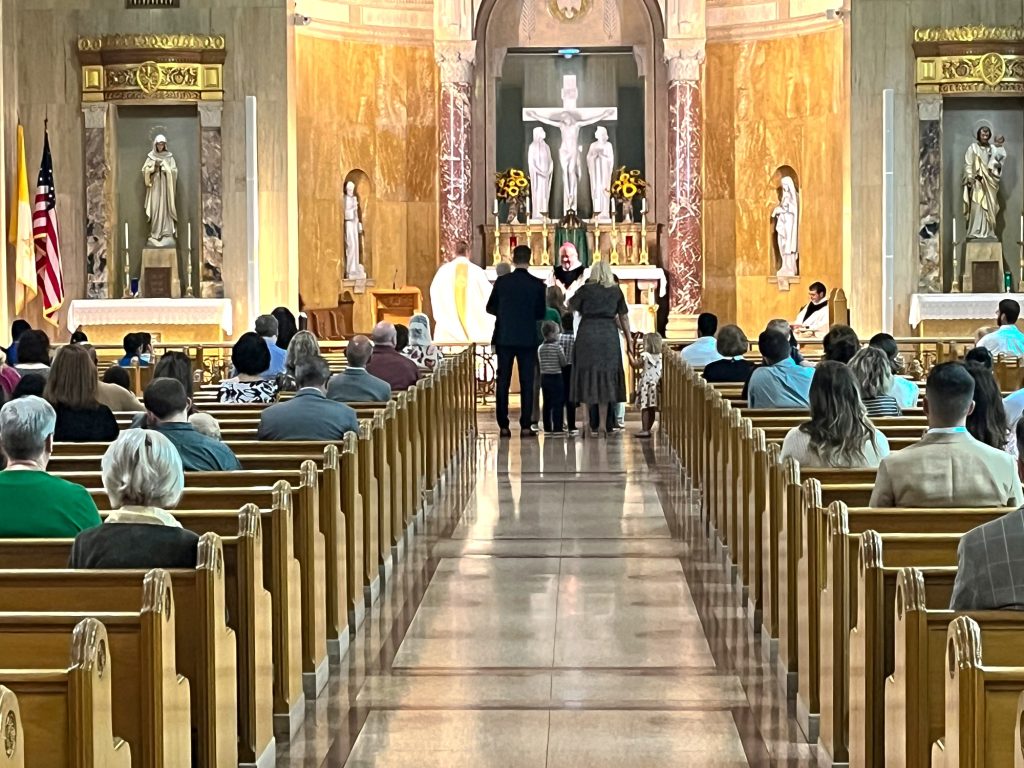Bishop Kemme: health care is grounded in the dignity of every human person

The fundamental principle in providing health care is recognizing the dignity of the human person from the moment of conception until natural death, Bishop Carl A. Kemme said at a White Mass on Sunday, Oct. 22.
“This dignity is and should always be the guiding principle of all that we do in health care and every other service provided to our neighbor. When this is diminished to any degree, then health care becomes self-serving and opportunistic,” he said in his homily in the Chapel of the Sorrowful Mother at St. Francis Ascension Via Christi in Wichita.
Treat the entire person
“Then, tragically, only the disease or condition is treated and not the whole person. But with the dignity of the human person, made in the image and likeness of God, intact and most highly regarded, health care becomes holistic and personal, wherein the person is treated, not as a means to an end but as the end and goal itself.”
Bishop Kemme said he joins the entire Catholic family in recognizing the importance of Catholic health care in the world, in society, and in the diocese: “A service that is qualitatively different than what others provide. The health care that is offered here and in all our Catholic health care institutions is one based on the theological, spiritual, moral, and pastoral principles of our faith.”
White Mass an annual event
The White Mass is celebrated annually in the Diocese of Wichita for physicians, nurses, and other healthcare professionals. It derives its name from the color traditionally and – in many cases – still worn by healthcare providers. The Mass marked the conclusion of the diocese’s three color-coded Masses: a Blue Mass for the protection of all first responders, and the Red Mass for those called to serve in government and the legal community.
Bishop Kemme said Jesus often miraculously cured people of their maladies to invite them into discipleship. “His touch, his breath, his eyes, his words, all of these gestures of mercy and compassion healed not only the malady but the heart and the soul, for Jesus saw the whole person and often restored them to their rightful dignity and place in human society.”
A Gospel of Mercy
Jesus’ healing is foremost in the Gospel of St. Luke, he said, which has been called the Gospel of Mercy.
Luke presents Jesus as a healer and restorer of human dignity. He shows us the compassion and the love Jesus had for the sick, for the downtrodden, the isolated, and the forgotten,” the bishop said. “Many think that St. Luke did this because tradition holds that he himself was a doctor of sorts, one who in his day and time practiced the healing arts. That is why St. Luke is the patron of all of you, who are so dedicated to the healing ministry.”
The Gospel is more than just text to be read and studied, Bishop Kemme said, it is a living witness of God’s life and love in Jesus Christ.
Living witnesses
“May I suggest, then, that each of you are and can be a gospel of mercy as you deliver the service you are called to provide to those under your care. Your compassion, your understanding, patience, and gentleness can be and needs to be a living witness and message of God’s compassion and mercy.”
If those attending work as living witnesses in their care of the sick, he said, “then the healing ministry of Jesus reaches its highest level and potential.”
Bishop Kemme closed his homily by imploring the intercession of St. Luke, the patron of healthcare workers, and St. Gianna Barretta Mollo, a heroic doctor, wife, and mother.
